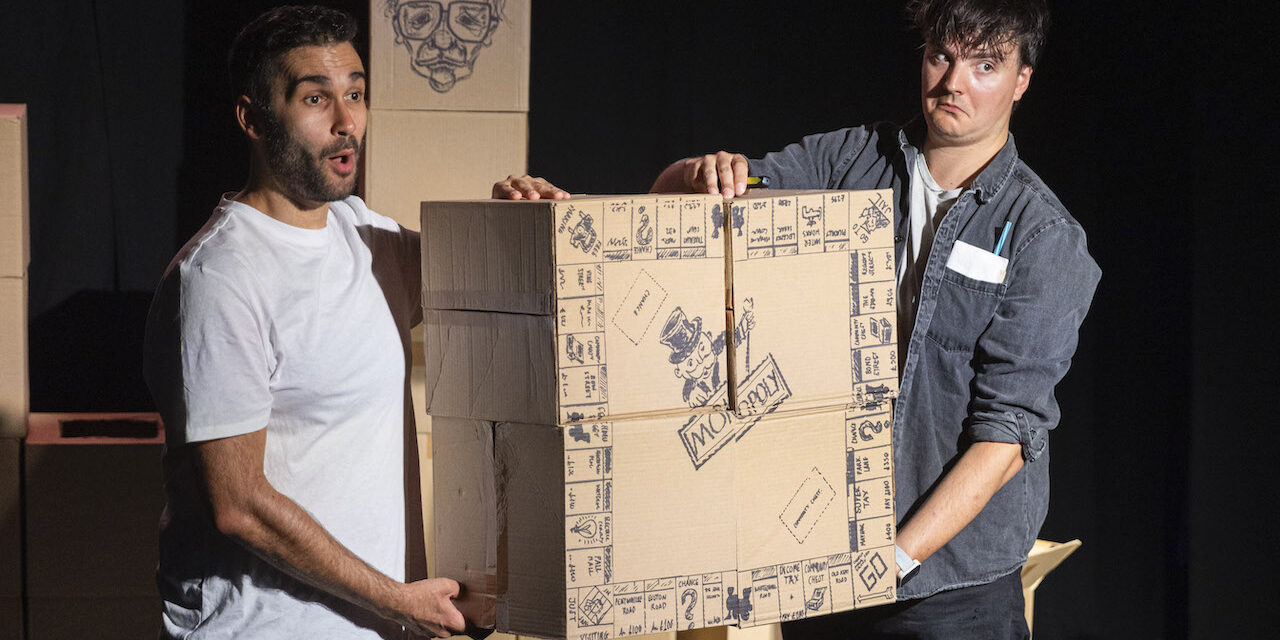
17 – 18 September
Of the many devices used by Joe Sellman-Leava and Dylan Howells in their two-man, hour-long show about the politics of money, one stands out more than most. Simply, it is the sound of a heavy knock on a front door, signalling the arrival of a bailiff. That ‘remembered’ sound was chill enough to give gravitas to Sellman-Leava’s very personal backstory, his attempts to make sense of a system that crushed his parents’ efforts to run a business.
Drawing from Keynes, Stiglitz and Kate Raworth’s Donut Economics, Sellman-Leava manages to turn what could have been a sour discourse about financial unfairness into an entertaining hour of monetary self-awareness.
It’s the Economy, Stupid! (the title taken from James Carville’s successful political slogan from the 1992 Presidential election) is delivered like a dramatized Ted Talk by Sellman-Leava. But, with a happy blending of skills with stage and lighting designer Howells, who also has a part as Leava’s moderator on stage (no overt left or right leaning rants allowed), there are moments of magic (literally) to savour along the way as well as funny banter between the two.
Howells’ use of square cardboard boxes, doubling as projection screens, rotating cartoon caricature canvasses and as a Monopoly board provided an effective low-tech focal backdrop. Howells’ use of magic – in particular his conjuring metaphor for how banks swallow our money – provided witty interventions that kept the heavier stuff palatable. And Sellman-Leava’s ability to impersonate the voices of Clinton, Thatcher, John Major and Rishi Sunak added yet more colour to this overarching mural to inequality.
We learn of Sellman-Leava’s childhood back in the 1980’s, when his parents ran a grocery shop in an urban environment, from which a narrow footbridge over a teaming motorway to a wild bramble patch was enough to fuel a child’s imagination with a degree of thrill. Ruined by the sheer financial power of supermarkets to undercut their business, they at least had the advantage of a safety net in the form of a council house, offered when theirs was requisitioned during bankruptcy – a net since torn up in the age of austerity. Sellman-Leava reminds us, these are political choices – who pays, who hoards?
Sellman-Leava is a Millennial, now in his mid-thirties. What has life been like for him during the recessions of 2008 and subsequently throughout Covid? The answer is he’s literally flat on his back from exhaustion, working 9 till 2am to try to hold on to the 3 percent stake in a shared flat that he believes will give him a chance to keep a foot on the property ladder. But at what cost to his mental and physical health? Running harder, still failing, this is a game (capitalism) that only a few can claim success playing.
Delving into the history of the game of Monopoly Sellman-Leava points out that the original version, called The Landlord’s Game designed by Lizzie Magie in 1903, demonstrated that an economy that rewarded individuals was better than one where monopolies held all the wealth. But there was also another version in which a more aggressive approach resulted in a winner-takes-all conclusion. Seems that in life as well as in gaming we are led to believe this is the better model to follow. Perhaps, if we stop long enough to consider other, more egalitarian ways for our money to circulate, as Sellman-Leava has thoughtfully done on our behalf, then there just might be a chance for more of us to live happier ever after. And further, to redefine what we really mean by failure. A lack of money doesn’t mean you have lost your humanity. Despite bankruptcy, Sellman-Leava’s parents still provided a loving home throughout a financial trauma.
At the Q&A after the show, Sellman-Leava was asked what single thing he believed could be done to change the system we live in, what could prevent the creation of an uber-rich and a forgotten poor? “Tax the rich,” was his simple and straightforward reply.
★★★★☆ Simon Bishop, 18 September 2024
Photo credit: Duncan McGlynn


